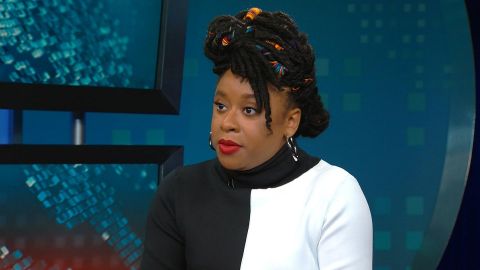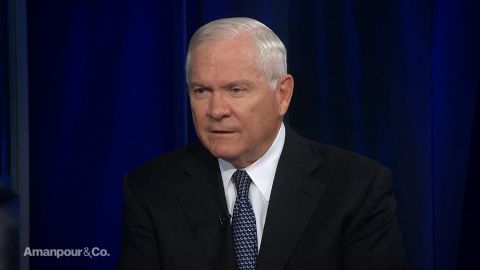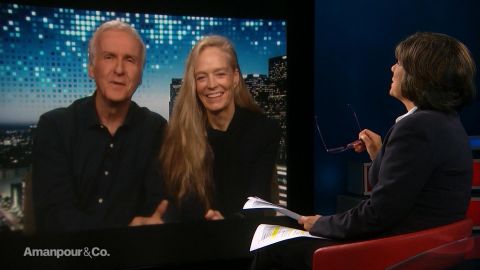Read Transcript EXPAND
ALICIA MENENDEZ: Phoebe, your first book was a “New York Times” bestseller, “You Can’t Touch My Hair.” And now you have your new book, “Everything’s Trash But It’s Okay.” Tell me about this book. Why now?
PHOEBE ROBINSON, AUTHOR, “EVERYTHING’S TRASH BUT IT’S OKAY”: Yes, I think – – I was always planning on writing another book, but I think after the 2016 election, I know like myself and a lot of my friends were just kind of feeling like, oh, well, that’s not how we thought the movie was going to end, you know? And I felt defeated and kind of like bummed out.
But then I really was like inspired by on social media and also in real like how people were doing rallies and donations are getting so involved with like politics in a way that like I hadn’t seen. Like people now are talking about midterm elections, especially like on college campuses. And I went to Pratt Institute in Brooklyn and, you know, New York is very like involved in politics and we never talked about midterm elections.
So I sort of was feeling down, but then I was like, there’s so much good that’s also happening right now. So that’s how the title came about. Like, everything is kind of terrible, it feels like, but we’re going to be OK, I think, I hope.
MENENDEZ: There’s a section of your book that speaks to it that I would love for you to read for me.
ROBINSON: Thank you. OK. Ah, ah, ah, ah. Just kidding.
Maybe I shouldn’t have been so rocked by the election results. I mean once homeboy launched his improbable campaign, which got more successful by the week in spite of his around-the-clock blunders, shouldn’t I have seen it for what it was, an upgraded version of a bigoted bat signal. The original one was a spotlight shining in the sky and projecting an image of the KKK’s David Duke. That was a call to action for people of Trump’s ilk, the racists, the sexists, the homophobes, the transphobes, et cetera. Therefore I couldn’t help but wonder, isn’t the fact that I’ve never fully believe Trump could be number 45 a sign that my stubbornness and naivete preventing me from seeing America for what it truly is.
Oh, who wrote this? I did.
MENENDEZ: So my question as I read that section of the book —
ROBINSON: Yes.
MENENDEZ: Was, so then what is America truly?
ROBINSON: I think America has a very complicated history and past and I think we tend to sort of like kind of brush a lot of the inequalities, whether it’s racial, class, or gender under the rug and be like, we’re so great and rah, rah, rah, rah, and like do the Fourth of July and all the like holiday stuff. But I’m like, there’s a lot of ugliness in our past I think we need to address because that’s kind of why things are the way they are currently. So I think America is a great idea that we haven’t quite figured out yet how to execute in a way that I think will be representative for everyone that lives here.
MENENDEZ: Did writing this book help you reconcile your ambivalence around (INAUDIBLE)?
ROBINSON: That’s a great question. Here’s what I will say. When the women’s march was happening, I think a lot of us were feeling the rah, rah of it all and like, yes, women are rallying together and you’re very excited about that. And, you know, Lana Glazer (ph) and I did a show there and raised money. Like, it was a really great, exciting moment.
MENENDEZ: And there was ambivalence on the part of black women.
ROBINSON: Yes. Yes.
MENENDEZ: It was — even thought that there was supposed to be diversity and leadership that fundamentally there would be white turnout.
ROBINSON: Right. And, you know, the lack of representation for queer women, especially like not treating trans women as women. And so I think, on online when that was happy, I was so excited, but it wasn’t the only thing that I was feeling. And I think by writing this essay, being like, I was conflicted about going and like there still are problems with feminism and like the lack of intersectionality, the lack of white women showing up for issues. Like, it’s great that everyone came out for the women’s march, but I saw almost none of those women like do any sort of like, yes, let’s do Black Lives Matter or let’s talk about immigration, or let’s talk about trans lives.
So I think it’s like when they felt ready to mobilize, they wanted everyone else to get on board with them. And it’s like, well, you also have to get on board with us. And so I think that’s still where feminism is kind of lacking, but I’m feeling hopeful.
MENENDEZ: Let’s unpack that a little because you write about it in the book about white women and white women feeling like they don’t have an access point for conversations about race.
ROBINSON: Yes.
MENENDEZ: So how — how do you bring white women into the fold? How do you extended that invitation such that they show up when you want them to show up?
ROBINSON: Right. I think there’s part of it is, like with anything that you’re interested in, if you really, truly care, you’ll do the research.
You’ll reach out to people. You’ll talk to people. So I personally don’t guy the whole like, well, how do I get involved? And I’m like, are you not listening to the Asian (ph) women, the queer women, the black women, all different sorts of women around you who are saying, this is an issue, this is important to me, this is a problem?
And so I think that there needs to be a little bit of — not waiting for everyone to teach you and sort of just being proactive and saying, I want to learn. Like, you’re a curious person. I’m a curious person. If I want to know when Beyonce is going to be on tour, don’t I Google it? You know, you can sort of do the same thing where you’re like, OK, why are trans women being murdered at a much higher rate than other women? Let me look into that. How can I get involved? How can I help?
SO I think it’s the same sort of thing. And I think these are tough conversation and really, you know, depressing issues to talk about sometimes, but by not talking about it, we’re allowing it to continue.
MENENDEZ: You’re perhaps best known for being one half of “2 Dope Queens,” which was originally started as a podcast show and is now on HBO. Can you tell us a little bit about it for someone who may not have seen it?
ROBINSON: It started four years ago, yes, 2014, Jess was on the — Jessica William, I should say, Jessica Williams was on “The Daily Show” and I just did background on a piece she did about black women (INAUDIBLE) in the military. And we sort of just like hit it off. We were just hanging around on set. And she said she always wanted to try and do standup. And I was like, oh, well, we can just do a random like one-off show together as a goof.
And we had so much fun. And we just like got on stage and I think we really sort of captured the way that a lot of people talking. I think especially a way that a lot of black women talk when people aren’t looking. And I think people could really sense that friendship and that sort of relaxed nature.
And then we kept doing it. And I was like, I think this is an HBO thing.
(BEGIN VIDEO CLIP)
ROBINSON: Like each — like strain of gray hair that comes in, I’m like, oh, one step closer to a Black History Month stamp. Like it feels very —
(END VIDEO CLIP)
ROBINSON: I really love variety shows and I think they haven’t been — they’re trying to come back and I think we just found this secret way of like doing, you know, a comedy show where we have our funniest friends on and interviewing celebrities in a way that doesn’t make them feel pressured and they can just have fun and be themselves. And we just really found this like secret formula that worked.
(BEGIN VIDEO CLIP)
UNIDENTIFIED FEMALE: I don’t want you to say that. I feel like you just said that on HBO special.
UNIDENTIFIED FEMALE: I did it. I did it. I didn’t say that on the spesh (ph).
UNIDENTIFIED FEMALE: I have to stay forever young for the industry, OK?
UNIDENTIFIED FEMALE: (INAUDIBLE) all of our cameras that we’re sharing together.
How dare you.
I got this back camera and I got this camera back here. So —
(END VIDEO CLIP)
MENENDEZ: And you’ve also used the show to be a launching pad for other women of color.
ROBINSON: Absolutely. I mean Jess and I both started out at improv. You know, we just saw — we’re like, so many of our friends are funny women, people of color, queer people and we don’t see them like necessarily on late night shows or giving the writing job opportunities or the acting opportunities and we’re like, well, why don’t we just have a show where we book like our funny friends and they can have this platform too. And I think it just really resonated with people who maybe aren’t huge like standup people to be like, oh, there are people out there who are funny who look like me, who sound like me, and I can relate to this.
MENENDEZ: Right now we’re in a moment where we are seeing misogamy and harassment exposed in every industry.
ROBINSON: Yes.
MENENDEZ: Comedy, one of those industries. But part of what you call out in the book that I think is really interesting is that it’s an industrywide problem. It’s not an organizational problem. So someone who works in the office, they could go to an HR department and say, hey, someone’s being really creepy with me. You can’t do that when you’re not inside an organizational structure. And so I wonder then, when it’s an industrywide problem, how do you bring about change?
ROBINSON: At a certain point we need to hold like comedy clubs accountable, comedy festivals accountable. The sort of gatekeepers and have them really be like this person has been doing sexually inappropriate things in the workplace. We’re not going to just welcome them back with open arms. You’re not going to just be like, oh, if this person drops in on this show, you can leave if you want. It’s like, no, I think it’s not having that person perform there anymore because, you know, a standup show is the workplace. If someone’s behaving inappropriately at a standup show, at a hotel where a festival is happening, it’s just like, well, I just don’t think that person can be trusted to be in this space again.
And I think it makes a lot of female comedians feel uncomfortable. It’s like, well, I don’t want to come back to this club if I think that some guys is going to show up who’s been really just inappropriate and sexually abusive to other women.
MENENDEZ: What are the more subtle forms of misogyny that female comics contend with?
ROBINSON: I think there’s a lot of — I remember when I — because everyone kind of starts out doing standup and you’re kind of like a baby in the way that your jokes aren’t really that good but you have that belief, you know, so you can kind of like (INAUDIBLE) personality.
And I’ve seen a lot where you see a female comedian start to get really good in the way that comedians just like know how to like crush a show and you’ll see the women crush and like none of the guys on the lineup will talk to her. Or like you’ll show up to a show and like no one will talk to me and then I’ll have like a good set and the guys are like, oh, hey, what’s up? And so it’s all this sort of like hazing that happens where you’re kind of like, am I funny? No one’s talking to me, does this mean I suck? So there’s a lot of mind games I feel like.
MENENDEZ: How are those experiences further complicated for women of color?
ROBINSON: I think racism makes it kes ON: How are those experiences further complicated for women of color? ‘s that good but you have that belief, you know, so so difficult. So there’s a tendency to just be like, oh, well, if I have this Asian girl on then it’s just like a charity thing or this black girl, she’s — she’s OK because she’s not like the other black comics. So there’s a lot of this sort of like separation that happens or where you have to like fill you have to fit in a sort of — a certain way and I think that what — I’ve been inspired by people like, you know, Tiffany Hattish (ph) and the Ally Wongs (ph) and just women who are really staying true to their own voices and I think that’s what, you know, I’ve done and Jessica has done.
And I think, for me, it took a lot of I’m still working on the like not feeling inadequate when I’m in a room of mostly —
MENENDEZ: Really?
ROBINSON: Yes. I mean if you’re on a show and you’re the — I tend to be either the only woman or the only person of color in a show and it’s all these white guys and, you know, I just do standup a little bit differently. And I can just sense that sometimes there’s a little bit like oh you don’t do it like the way we do it. And, I don’t know, it’s tough and I just think that women of color really have to sort of like just because your story is different and your voice is different doesn’t mean that it’s not valid. It’s more valid because we need to have different points of view in order to all laugh and exist on this planet together.
MENENDEZ: If people take one thing away from this book, what do you want it to be?
ROBINSON: I think the one thing would be to be more self-aware. I think I learned through writing the book to be more self-aware and to sort of analyze the experiences that happen to you. Like the essay I wrote about size stuff and how doing like a lot of photo shoots, which, again, high- class problem, but I would just always be like, if — I would tell people, hey, I’m a 10-12, size 10-12, which is, I think, a very kind of regular average joe size, and then they would just bring me like a size four or a six and I couldn’t fit into it. I’d be like, oh, I’m so sorry. And I just kept always apologizing instead of being like, no, I showed up to this. I gave you my sizes. I’m not going to feel bad that I’m not a size two or a four.
And so I think there’s so many times, with women especially in life, you just sort of take the brunt of responsibility for something that’s not your fault, you know what I mean? And so I think with this book I learned how to like speak up for myself more, whether it’s size, like clothing issues, or like a guy making a sexually inappropriate comments to me because sometimes I’ve just been like, oh, ha, ha, like we’re taught to sort of like smile or like just laugh it off. Don’t make the guy feel uncomfortable. And I think we’re all in this time period right now being like, we don’t have to do that anymore, you know.
MENENDEZ: Well, so now that you feel empowered to do that, are there things you look back on that you say, I wish I would have shut that down a lot sooner?
ROBINSON: Yes. I think what I look back on is comedy is very much, you don’t make a lot of money for a really long time. You kind of put up with sort of like not great conditions. And I think being in comedy for 10 years and having the sort of success that I’m starting to have, like I’m not willing to ask for what I think I deserve, instead is just being like, well, I should just be happy that I got an offer. Now I’m like, no, if you want this quality work for me, you have to pay me what I know you’re paying a white guy. You just have to do it. And I’m OK asking it. And I find that like I haven’t had any problems being like this is what I think I deserve. And so I’m glad that I’m learning that lesson now in my early 30s and I hope that carries thorough. But, yes, I think that’s a thing I look back on, it’s just like, I’ve done like a lot of work for free or like $50 I’ll write something. And it’s just like, you don’t have to accept that anymore.
MENENDEZ: Thank you so much.
ROBINSON: Thanks for having me.
About This Episode EXPAND
TBD
LEARN MORE


